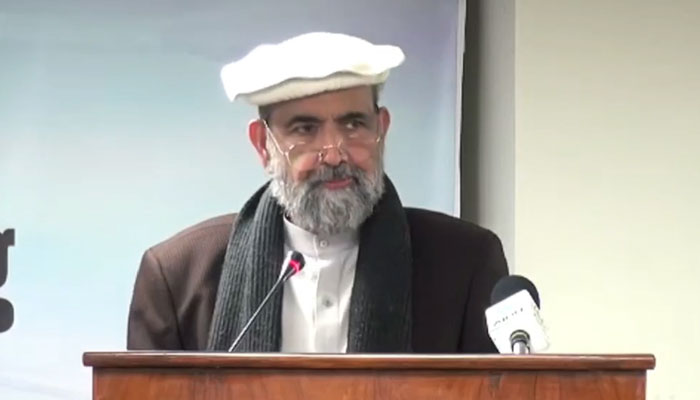Scholars explore religion’s role in fostering global peace, harmony
Islamabad : In a rare and inspiring gathering, scholars and religious leaders representing six different faiths discussed the transformative role of religion in fostering peace, harmony, and justice here at an international seminar. The event titled “The Role of Religions in Fostering Peace, Harmony, and Justice” and organised by the Institute of Policy Studies, brought together voices from Islam, Christianity, Hinduism, Sikhism, Buddhism, and Judaism to explore how shared ethical values and consciously practiced faith can bridge divides, counter misconceptions, and create a foundation for global unity.
It highlighted the potential of dialogue among followers of different faiths to address contemporary challenges and promote inclusive narratives rooted in mutual respect and understanding.
The speakers observed that the adaptability of religious teachings in diverse contexts demonstrates their potential to bridge gaps, transforming dialogue into tangible change and offering hope for a future rooted in shared ethical values. “Inclusiveness is inherent in all religions,” said Dr Qibla Ayaz of the Supreme Court's Shariat Appellate Bench. He, however, said the media’s attention to adverse incidents while overlooking positive contributions fuels religious nationalism. He suggested that religious advocates, policy influencers, and followers of religion must take collective responsibility to bridge gaps, promote unity, and use social media to amplify messages of inclusivity.
Highlighting Islam’s message of peace, justice, forgiveness, and respect for diversity, Dr Hafiz Waqas Khan of Riphah International University, Islamabad, noted that the term “Islam” itself signified peace. He emphasised Islam’s commitment to equality and the message of reconciliation and moral leadership in fostering harmony and justice, as outlined in the Quran and Sunnah.
Reflecting on Christianity’s ethos of peace, Rev Fr Prof Sarfraz Simon of Catholic Church underscored that true peace stems from “trust in God and harmonious relationships.” He said freely chosen and consciously practiced faith was crucial in preventing religious violence and fostering a culture of peace. Dr Neelima Shukla-Bhatt of Wellesley College, USA, underscored Hinduism’s inherent pluralism, rooted in the Rig Vedic principle of “welcoming noble ideas from all directions.”
She highlighted ‘religious tolerance’ and ‘acceptance of diversity’ as key Vedic principles to global harmony. Quoting Sikh teachings on self-reflection and generosity, Dr Kalyan Singh Kalyan of GC University, Lahore, stressed the need to overcome misunderstandings and misconceptions about religious teachings. Dr Samantha Ilangakoon of University of Peradeniya, Sri Lanka, shared the Buddhist ethical framework, which focuses on refraining from evil, doing good, and purifying the mind while emphasizing the belief in the egalitarian nature and potential for liberation in all humans.
-
 King Charles ‘very Much’ Wants Andrew To Testify At US Congress
King Charles ‘very Much’ Wants Andrew To Testify At US Congress -
 Rosie O’Donnell Secretly Returned To US To Test Safety
Rosie O’Donnell Secretly Returned To US To Test Safety -
 Meghan Markle, Prince Harry Spotted On Date Night On Valentine’s Day
Meghan Markle, Prince Harry Spotted On Date Night On Valentine’s Day -
 King Charles Butler Spills Valentine’s Day Dinner Blunders
King Charles Butler Spills Valentine’s Day Dinner Blunders -
 Brooklyn Beckham Hits Back At Gordon Ramsay With Subtle Move Over Remark On His Personal Life
Brooklyn Beckham Hits Back At Gordon Ramsay With Subtle Move Over Remark On His Personal Life -
 Meghan Markle Showcases Princess Lilibet Face On Valentine’s Day
Meghan Markle Showcases Princess Lilibet Face On Valentine’s Day -
 Harry Styles Opens Up About Isolation After One Direction Split
Harry Styles Opens Up About Isolation After One Direction Split -
 Shamed Andrew Was ‘face To Face’ With Epstein Files, Mocked For Lying
Shamed Andrew Was ‘face To Face’ With Epstein Files, Mocked For Lying -
 Kanye West Projected To Explode Music Charts With 'Bully' After He Apologized Over Antisemitism
Kanye West Projected To Explode Music Charts With 'Bully' After He Apologized Over Antisemitism -
 Leighton Meester Reflects On How Valentine’s Day Feels Like Now
Leighton Meester Reflects On How Valentine’s Day Feels Like Now -
 Sarah Ferguson ‘won’t Let Go Without A Fight’ After Royal Exile
Sarah Ferguson ‘won’t Let Go Without A Fight’ After Royal Exile -
 Adam Sandler Makes Brutal Confession: 'I Do Not Love Comedy First'
Adam Sandler Makes Brutal Confession: 'I Do Not Love Comedy First' -
 'Harry Potter' Star Rupert Grint Shares Where He Stands Politically
'Harry Potter' Star Rupert Grint Shares Where He Stands Politically -
 Drama Outside Nancy Guthrie's Home Unfolds Described As 'circus'
Drama Outside Nancy Guthrie's Home Unfolds Described As 'circus' -
 Marco Rubio Sends Message Of Unity To Europe
Marco Rubio Sends Message Of Unity To Europe -
 Savannah's Interview With Epstein Victim, Who Sued UK's Andrew, Surfaces Amid Guthrie Abduction
Savannah's Interview With Epstein Victim, Who Sued UK's Andrew, Surfaces Amid Guthrie Abduction




